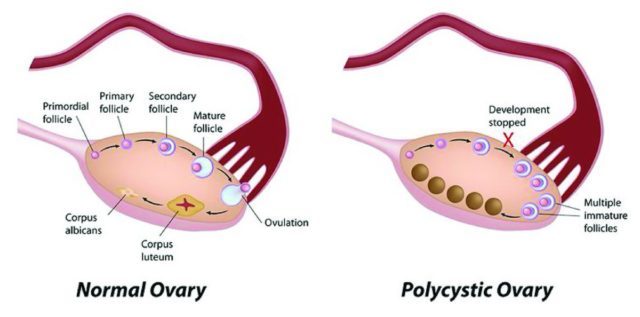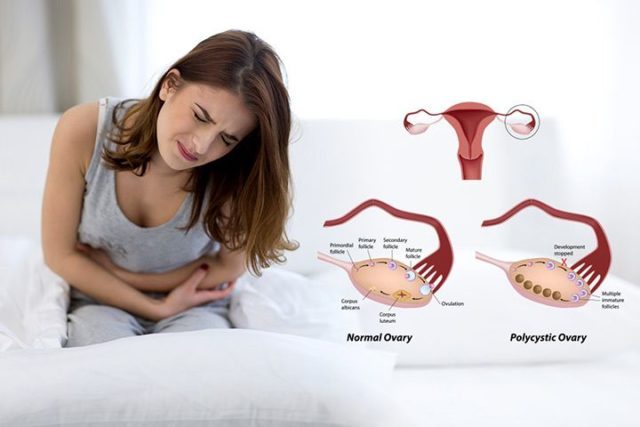Maybe you have not heard of this syndrome, but it is not an unusual disease. In fact, between 5% and 20% of women around the world suffer from it. It is characterized by the enlargement of the ovaries, in which small and multiple cysts are formed.

It is a hormonal type disorder that has undesirable consequences, generating an excess of facial and breast hair and overweight. It can also cause infertility and have other long-term health problems, such as the possible occurrence of diabetes and heart disorders, including high cholesterol and high blood pressure.
The good news is that the polycystic ovary syndrome (PCOS) is treatable. The methods used today improve the quality of life of women who suffer from it.
What signs betray its presence?
It is advisable that you request an appointment with your doctor if you have more than two of the following symptoms: Irregular menstrual cycle, scanty or completely absence of menstruation, considerable overweight, family history of diabetes, also if you suffer from or are diagnosed with insulin resistance syndrome, difficulty getting pregnant, excess presence of hair in the face and breasts, severe acne, or the appearance of male signs (virilization), such as thicker voice or hair loss.

What originates it?
The causes of PCOS are essentially genetic and the transmitters can be both the mother and the father that is why it is important to carry out a follow-through in the family group, the sooner it is done the better
Can I suffer from this problem at any time in my life?
You may be diagnosed later or earlier in life with this disorder. But from the age of 20 is when the time is right to evaluate all the symptoms of the disease and determine if it is really about this syndrome.
What happens in my body when I have PCOS?
Basically, your hormones are not working as they should. Insulin which is responsible for helping the body to use sugar as fuel can also intervene specifically in different processes involving the ovaries. One of the most common characteristics of women who suffer from PCOS is insulin resistance. The tissues do not respond to it correctly.
What consequence does this have?
Usually overweight, diabetes, or tendency to suffer it in the future and increase cholesterol, blood pressure and the risk of heart disease. For this reason, it is not only important that you give relevance to the gynecological control, but to all your general health.
How do I know if I suffer from this symptom?
You cannot be guided by the advice of a friend or by the presence of a symptom of hirsutism, for example. The only way to diagnose it is through gynecological examination. A transvaginal ultrasound corroborates the existence of cysts.

Is it curable?
Unfortunately no. Doctors cannot modify the genetics of people, but they can treat the symptoms. And the earlier the diagnosis is made, the greater the chances of counteracting it.
Do all women have cysts?
Yes, but there is nothing to be afraid of, it is ruled out the idea that cysts are necessarily related to cancer. There are many types and only one of them is associated with PCOS. Having a cyst in the ovaries does not mean that you must develop this syndrome.
Is suffering from them synonymous with infertility?
Absolutely not. If menstrual disorders are corrected and insulin resistance is emphasized, Fertility is achieved with modification of some habits. But sterility is not the only ghost around those who suffer from this disorder. The consequences of PCOS go beyond reproductive issues. Women who suffer from it are at greater risk of developing metabolic and cardiovascular diseases at an early age.
Does it always mean overweight?
Specialists coincide in pointing out that around 30% to 70% of women with PCOS are obese or in overweight. In addition, those who present the syndrome show an increase in abdominal fat. Pay attention to this data. When the contour of the waist usually exceeds 80 centimeters this shows that your body does not react properly to insulin.
If I suffer from PCOS I will inevitably develop some masculine traits?
This condition is one of the elements that are evaluated when making a diagnosis of PCOS since hyperandrogenism, the increase in women of male hormones such as testosterone is a constitutive element of this disorder.
So the best advice is to keep a regular gynecological control during all your life and follow all the indications that are given to optimize your health.
![]()

